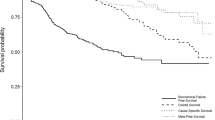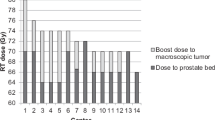Abstract
Introduction
Salvage radiotherapy (SRT) after radical prostatectomy for prostate cancer (PCa) is recommended as soon as PSA rises above 0.20 ng/ml, but many patients (pts) still experience local macroscopic relapse. The aim of this multicentric retrospective analysis was to evaluate the role of SRT in pts with macroscopic relapse.
Materials and methods
From 2001 to 2016, 105 consecutive pts with macroscopic PCa relapse underwent SRT ± androgen deprivation therapy (ADT). Mean age was 72 years. At time of relapse, 29 pts had a PSA value < 1.0 ng/mL, 50 from 1.1 to 5, and 25 pts > 5. Before SRT, 23 pts had undergone 18F-choline PET and 15 pts pelvic MRI. Ninety-four pts had prostatic bed relapse only, and four nodal involvement. Fifty-one pts were previously submitted to first-line ADT, while 6 pts received ≥ 2 lines.
Results
At a median follow-up of 52 months, 89 pts were alive, while 16 were dead. Total RT dose to macroscopic lesions was > 70 Gy in 58 pts, 66–70 Gy in 43, and < 66 Gy in 4 pts. In 72 pts, target volume encompassed only the prostatic bed with sequential boost to macroscopic site; 33 pts received prophylactic pelvic RT. Ten-year overall survival was 76.1%, while distant metastasis-free survival was 73.3%. No grade 4–5 toxicities were found.
Conclusions
SRT ± ADT for macroscopic relapse showed a favorable oncological outcome supporting its important role in this scenario. Data from this series suggest that SRT may either postpone ADT or improve results over ADT alone in appropriately selected pts.
Similar content being viewed by others
References
Lau WK, Bergstralh EJ, Blute ML, Slezak JM, Zincke H. Radical prostatectomy for pathological Gleason 8 or greater prostate cancer: influence of concomitant pathological variables. J Urol. 2002;167:117–22.
Bolla M, van Poppel H, Tombal B, Vekemans K, Da Pozzo L, de Reijke TM, et al. Postoperative radiotherapy after radical prostatectomy for high-risk prostate cancer: long-term results of a randomised controlled trial (EORTC trial 22911). Lancet. 2012;380(9858):2018–27.
Stish BJ, Pisansky TM, Harmsen WS, Davis BJ, Tzou KS, Choo R, et al. Improved metastasis-free and survival outcomes with early salvage radiotherapy in men with detectable prostate-specific antigen after prostatectomy for prostate cancer. J Clin Oncol. 2016;34(32):3864–71.
Buergy D, Sertdemir M, Weidner A, Shelan M, Lohr F, Wenz F, et al. Detection of local recurrence with 3-Tesla MRI after radical prostatectomy: a useful method for radiation treatment Planning? vivo. 2018;32:125–31.
Panebianco V, Barchetti F, Sciarra A, Musio D, Forte V, Gentile V, et al. Prostate cancer recurrence after radical prostatectomy: the role of 3-T diffusion imaging in multi-parametric magnetic resonance imaging. Eur Radiol. 2013;23:1745–52.
Kitajima K, Murphy RC, Nathan MA, Froemming AT, Hagen CE, Takahashi N, et al. Detection of recurrent prostate cancer after radical prostatectomy: comparison of 11C-choline PET/CT with pelvic multiparametric MR imaging with endorectal coil. J Nucl Med. 2014;55:223–32.
Spratt DE, Dess RT, Zumsteg ZS, Lin DW, Tran PT, Morgan TM, et al. A systematic review and framework for the use of hormone therapy with salvage radiation therapy for recurrent prostate cancer. Eur Urol. 2018;73:156–65.
TNM (2016) AJCC 8th Edition, Editor Brierley JD, Gospodarowicz MK, Wittekind C. ISBN: 978-1-119-26356-2.
Shelan M, Abo-Madyan Y, Welzel G, Bolenz C, Kosakowski J, Behnam N, et al. Dose-escalated salvage radiotherapy after radical prostatectomy in high risk prostate cancer patients without hormone therapy: outcome, prognostic factors and late toxicity. Radiat Oncol. 2013;27(8):276. https://doi.org/10.1186/1748-717X-8-276.
Eisenhauer EA, Therasse P, Bogaerts J, Schwartz LH, Sargent D, Ford R, et al. New response evaluation criteria in solid tumours: revised RECIST guideline (version 1.1). Eur J Cancer. 2009;45(2):228–47.
The National Cancer Institute Common Terminology Criteria for Adverse Events Scale, Version 4.0. May 2009, revised June 2010.
Ravi P, Karnes RJ, Rangel LJ, Pagliaro LC. Outcomes and prognostic factors in men receiving androgen deprivation therapy for prostate cancer recurrence after radical prostatectomy. J Urol. 2018;200:1075–981.
NCCN Guidelines, Version 1.2018.
Borghetti P, Spiazzi L, Cozzaglio C, Pedretti S, Caraffini B, Triggiani L, et al. Postoperative radiotherapy for prostate cancer: the sooner the better and potential to reduce toxicity even further. Radiol Med. 2018;123(1):63–70.
Umbehr MH, Muntener M, Hany T, Sulser T, Bachann LM. The role of 11c-choline and 18f-fluorocholine positron emission tomography (PET) and PET/CT in prostate cancer: a systematic review and meta-analysis. Eur Urol. 2013;64(1):106–17.
Sandgren K, Westerlinck P, Jonsson JH, Blomqvist L, Thellenberg Karlsson C, Nyholm T et al. Imaging for the detection of locoregional recurrences in biochemical progression after radical prostatectomy-a systematic review. Eur Urol Focus. 2017. https://doi.org/10.1016/j.euf.2017.11.001.
Kim BS, Lashkari A, Vongtama R, Lee SP, Parker RG. Effect of pelvic lymph node irradiation in salvage therapy for patients with prostate cancer with a biochemical relapse following radical prostatectomy. Clin Prostate Cancer. 2004;3:93–7.
Ramey SJ, Agrawal S, Abramowitz MC, Moghanaki D, Pisansky TM, Efstathiou JA, et al. Multi-institutional evaluation of elective nodal irradiation and/or androgen deprivation therapy with postprostatectomy salvage radiotherapy for prostate cancer. Eur Urol. 2018;74(1):99–106.
Pasquier D, Nickers P, Peiffert D, Maingon P, Pommier P, Lacornerie T, et al. Hypofractionated stereotactic boost in intermediate risk prostate carcinoma: preliminary results of a multicenter phase II trial (CKNO–PRO). PLoS ONE. 2017;12(11):e0187794.
Byun SJ, Kim YS, Ahn H, Kim CS. Image-guided, whole-pelvic, intensity modulated radiotherapy for biochemical recurrence following radical prostatectomy in high-risk prostate cancer patients. PLoS ONE. 2018;13:e0190479.
Cotter SE, Chen MH, Moul JW, Lee WR, Koontz BF, Anscher MS, et al. Salvage radiation in men after prostate-specific antigen failure and the risk of death. Cancer. 2011;117:3925–32.
Moschini M, Soria F, Briganti A, Shariat SF. The impact of local treatment of the primary tumor site in node positive and metastatic prostate cancer patients. Prostate Cancer Prostatic Dis. 2017;20:7.
Shipley WU, Seiferheld W, Lukka HR, Major PP, Heney NM, Grignon DJ, et al. Radiation with or without antiandrogen therapy in recurrent prostate cancer. N Engl J Med. 2017;376(5):417–28.
Carrie C, Hasbini A, de Laroche G, Richaud P, Guerif S, Latorzeff I, et al. Salvage radiotherapy with or without short-term hormone therapy for rising prostate-specific antigen concentration after radical prostatectomy (GETUG-AFU 16): a randomised, multicentre, open-label phase 3 trial. Lancet Oncol. 2016;17:747–56.
Maru S, Uchino H, Osawa T, Chiba S, Mour G, Sazawa A. Long-term treatment outcomes of intermittent androgen deprivation therapy for relapsed prostate cancer after radical prostatectomy. PLoS ONE. 2018;13:e0197252.
Funding
No funding was foreseen to sustain this work
Author information
Authors and Affiliations
Corresponding author
Ethics declarations
Conflict of interest
Alessio Bruni was member of an Advisory Board for Astra Zeneca receiving a Grant. He also received a sponsorship from Ferring, Janssen and Astellas to participate to National and International Conference. He also received a speaker honorarium from Astra Zeneca. Gianluca Ingrosso declares he has no conflict of interests. Fabio Trippa declares he has no conflict of interests, Mario Di Staso declares he has no conflict of interests, Biancaluisa Lanfranchi declares he has no conflict of interests. Laura Rubino declares he has no conflict of interests; Silvia Parente declares he has no conflict of interest. Luca Frassinelli declares he has no conflict of interests. Ernesto Maranzano declares he has no conflict of interests. Riccardo Santoni declares he has no conflict of interests. Maria Chiara Sighinolfi declares he has no conflict of interests. Frank Lohr declares he has no conflict of interests. Ercole Mazzeo received an honorarium as expert from Janssen.
Ethical approval
All procedures performed in the study were in accordance with the ethical standards of the Institutional and National Research Committee and with the 1964 Helsinki Declaration and its later amendments or comparable ethical standards.
Informed consent
Informed consent for the treatment proposed was obtained from all individual participants included in the study.
Additional information
Publisher's Note
Springer Nature remains neutral with regard to jurisdictional claims in published maps and institutional affiliations.
This research did not receive any specific grant from funding agencies in the public, commercial, or not-for-profit sectors.
Appendix
Appendix
See Table 1.
Rights and permissions
About this article
Cite this article
Bruni, A., Ingrosso, G., Trippa, F. et al. Macroscopic locoregional relapse from prostate cancer: which role for salvage radiotherapy?. Clin Transl Oncol 21, 1532–1537 (2019). https://doi.org/10.1007/s12094-019-02084-0
Received:
Accepted:
Published:
Issue Date:
DOI: https://doi.org/10.1007/s12094-019-02084-0




